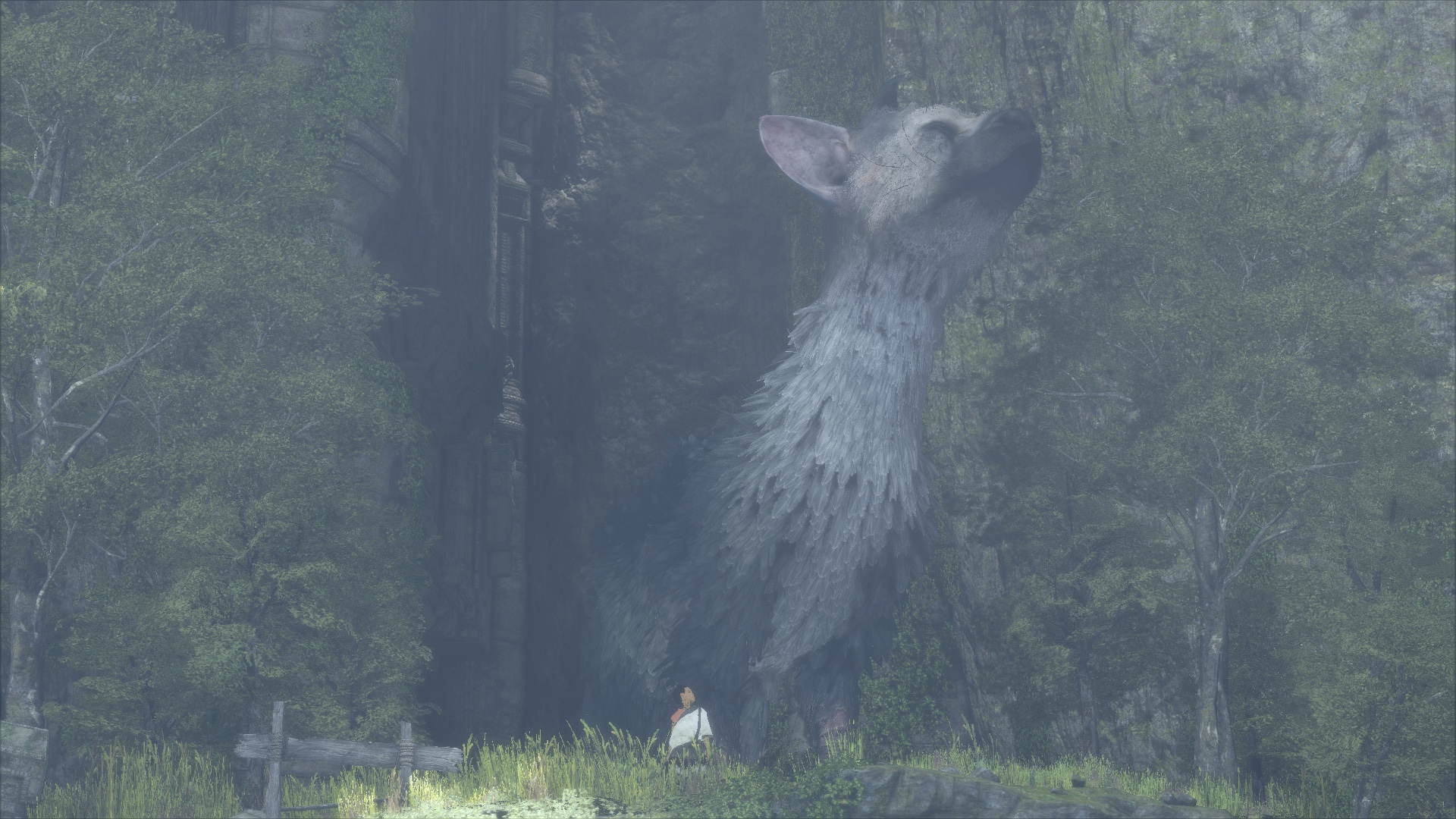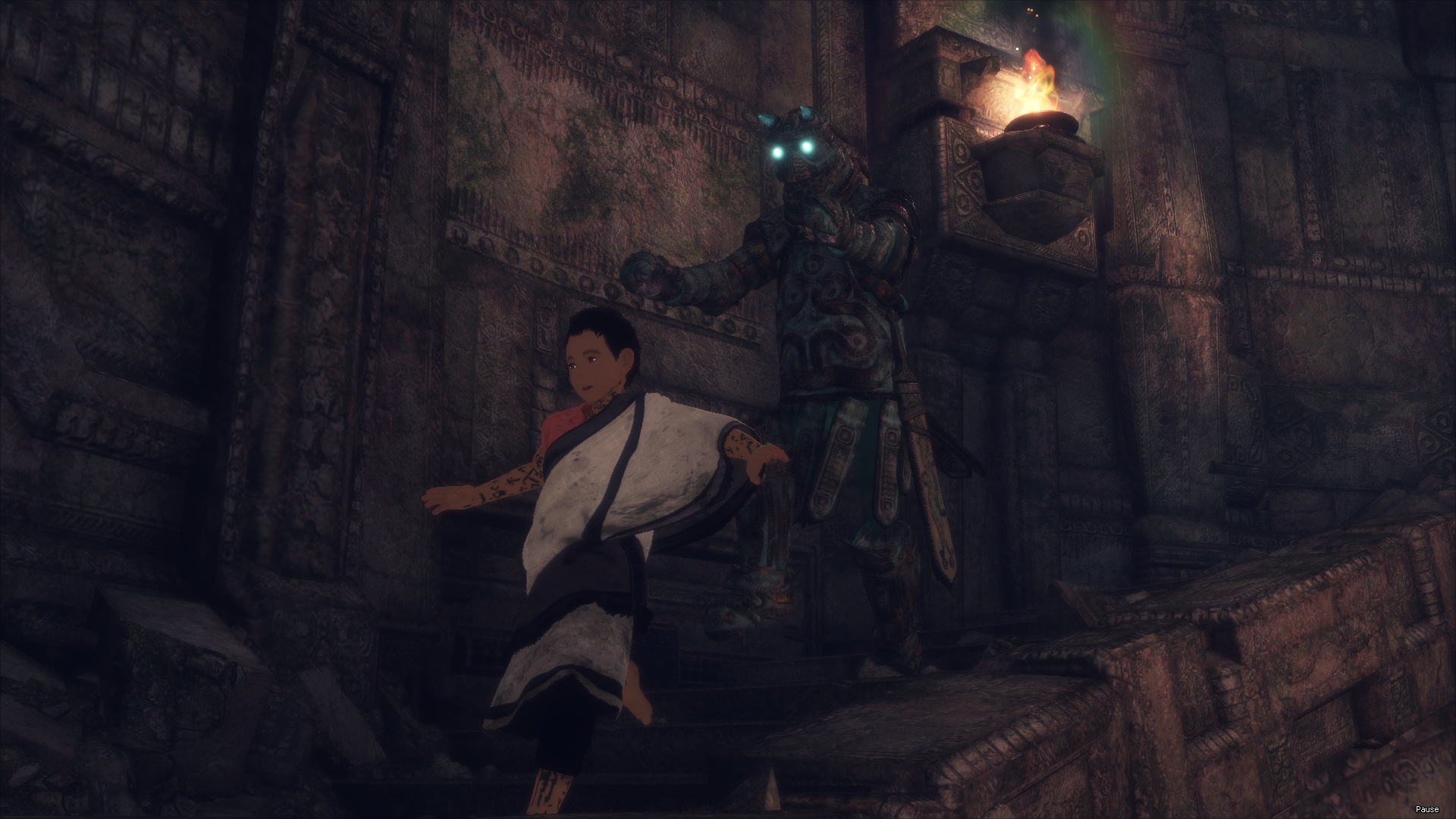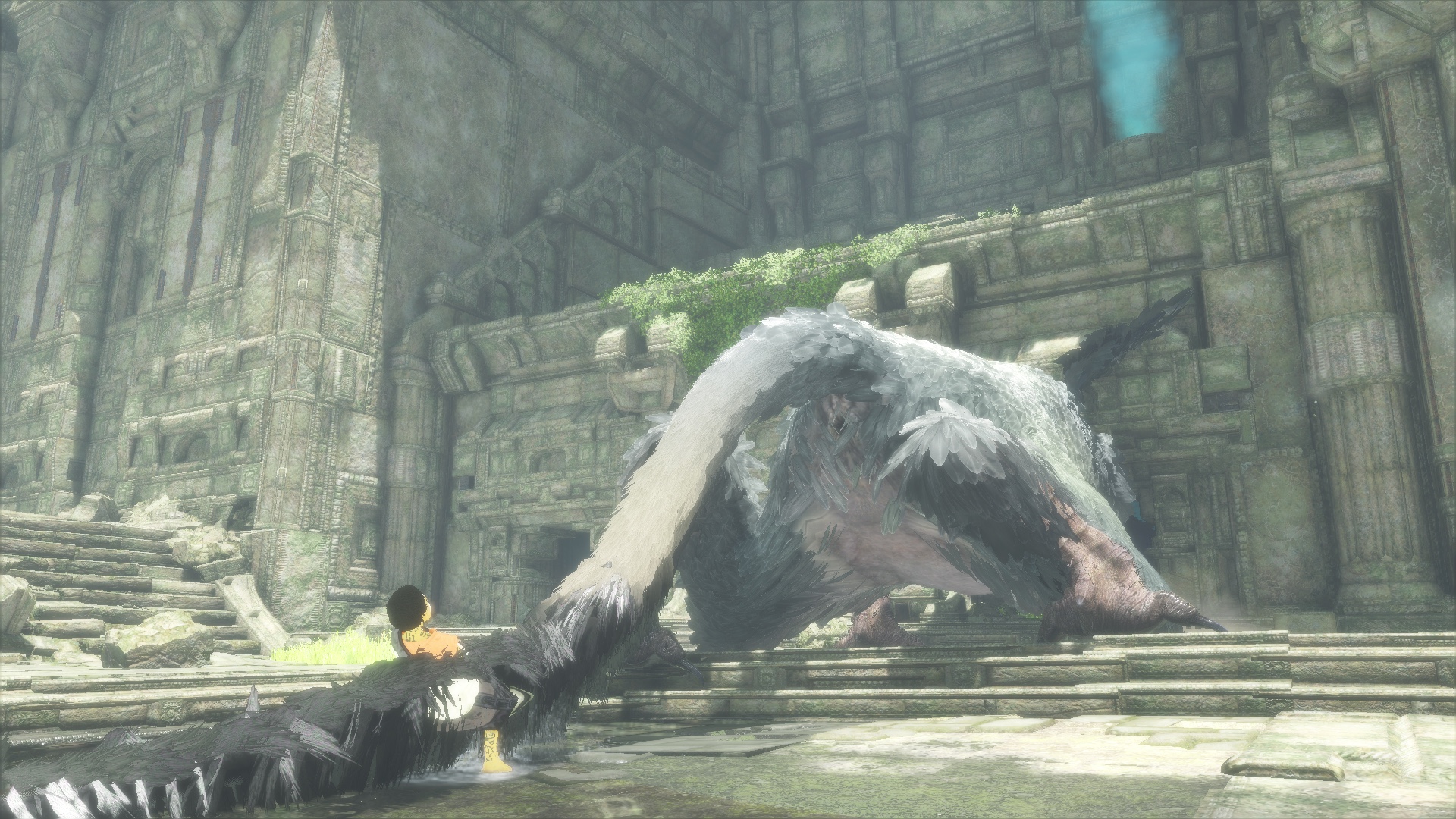The Last Guardian is a masterpiece. Not for being the game fans of Ico and Shadow of the Colossus hoped it might become for its seven developmentally fraught years, but because it’s so much better than anything I’d imagined possible. Designer-director Fumito Ueda hasn’t just crafted a boy’s adventure in a Land of Beautiful Things that exemplifies what I love about this medium.
In the game, out for Sony’s PlayStation 4 Dec. 6, you play as a child who wakes beside an enormous shackled creature in a subterranean lair. The creature’s name is Trico, a winged and feathered being that looks a bit like a griffin but without the eagle’s beak and a face that’s a composite of a cat’s, a dog’s and rabbit’s. Trico is bloody, missing bits of his horns, has spears protruding from his hindquarters. And he definitely doesn’t like you. Now figure out how to help him, says the game, without saying a word.
It’s all very mysterious and weird. You’re paired with a creature capable of magnificent feats of agility, dropped into a pit crosscut by crumbling, labyrinthine architecture and tasked with helping each other ascend skyward. The narrative reasons for this are eventually spelled out, wrought in Ueda’s minimalist style, and as elegiac as his earlier works, but ultimately not important. What is important is that Ueda has somehow conjured a virtual life that’s as physically plausible and emotionally convincing as something of the real world.

This is a bigger deal than words can convey. You have to experience it to understand the accomplishment.
Trico is a tour de force that feels years ahead of his time. There’s never been a creature like him in a game. He trembles in pain, yawns when tired, wanders when bored, whip-shakes himself dry when wet, plays with his food, gazes at things he finds interesting (and that sometimes you might, too). He’ll seek you out, lean down to nuzzle you, then if you dash off, chase you like a codependent pet, whining and frantically scanning for ways to get to you if you venture somewhere he can’t.
And when he’s hurt, woe unto whatever’s causing him pain, because here is a game that can summon genuine outrage without a trace of exposition. Here is an experience that earns your emotional involvement like an accreting tidal force, frighteningly powerful and often unexpectedly so. Here, at last, is an approach to the medium that understands empathy, and perhaps even what lies beyond.
Trico becomes The Last Guardian‘s ultimate puzzle, a Melvilleian force of nature grafted onto an ambulatory keyring tucked inside a transcendent simulacrum. If Trico sits (and won’t move), what does he want? How might you find it? If he’s upset, how might you calm him? If you need him to move somewhere specific, how do you tell him where to go? If he goes somewhere he shouldn’t, how do you steer him back? And if you need to proceed somewhere out of reach, how to persuade him to help? I’m clawing up my keyboard to share specifics here, but spoilers, so I’ll settle for noting that some of the game’s cleverest puzzles involve the pursuit of organic, as yet unseen Newtonian interactions.

As I played the game, I kept coming back to the Turing test, Alan Turing’s threshold for a computer semantically “smart” enough to fool a human into believing they’re conversing with another human being. But the test involves only words, so it’s like two people texting, reduced to syntax. What might a Turing test for nonlinguistic communication look like? A test, say, that gauged the plausibility of a virtual being who communicated by gestures, posture, facial expressions and movement through space? An experiment that also managed to slyly remind us of what we’ve sacrificed as we hunker in our social network silos?
The Last Guardian has answers. In Trico, Ueda has fashioned an extraordinary animalistic black box, a quasi-sentient creature with his own inclinations and operational vectors and sometimes inscrutable desires. Where others see pop-up placards or shoulder-tapping to steer the player gaze, Ueda sees teachable moments drawn from behavioral cues. The result as you make your way through the game’s stirring set pieces is a marvel, a triumphantly balanced lattice of constraints and emotionally unraveled resolutions.
Impatient players may balk at the way Trico sometimes ignores them, or how much time can pass before he’ll act in accord with their wishes. That would be a mistake and a misreading. The game’s contemplative sequences are as meaningful and essential as its fast and furious ones. Trico can be mercurial, adolescently willful and sometimes maddeningly stubborn, but he is always knowable. What he requires most is your patience, a virtue discarded by the handholding school of game design, an assumption provocatively challenged by Ueda throughout The Last Guardian.

Not that the puzzles are impenetrable. The game hides everything in plain sight, and its mysteries are generally iterative, one process or solution suggesting another. Much of the time you can sit back and let Trico do the work for you. Not literally, but by watching what he does, where he looks or goes, how he sits and the geometric configurations of his body in relation to the world around him. The congruity is breathtaking as you realize over the course of the game how deeply designed every permutation inside every scenario had to be.
“Language is a cracked kettle on which we bang out tunes to make the bears dance, when what we long for is to move the stars to pity,” wrote the French novelist Gustave Flaubert in Madame Bovary. In The Last Guardian, Fumito Ueda is showing us how to bang out another kind of tune that makes something else move, something perhaps higher. It feels momentous, a design breakthrough I wasn’t expecting, and an experience that seems more likely to stand the test of time than others we like to point to. It calls out some of what’s crass about this industry while showing us another way forward, the shape of things to come.
5 out of 5
Reviewed on PlayStation 4 Pro
More Must-Reads from TIME
- Where Trump 2.0 Will Differ From 1.0
- How Elon Musk Became a Kingmaker
- The Power—And Limits—of Peer Support
- The 100 Must-Read Books of 2024
- Column: If Optimism Feels Ridiculous Now, Try Hope
- The Future of Climate Action Is Trade Policy
- FX’s Say Nothing Is the Must-Watch Political Thriller of 2024
- Merle Bombardieri Is Helping People Make the Baby Decision
Write to Matt Peckham at matt.peckham@time.com